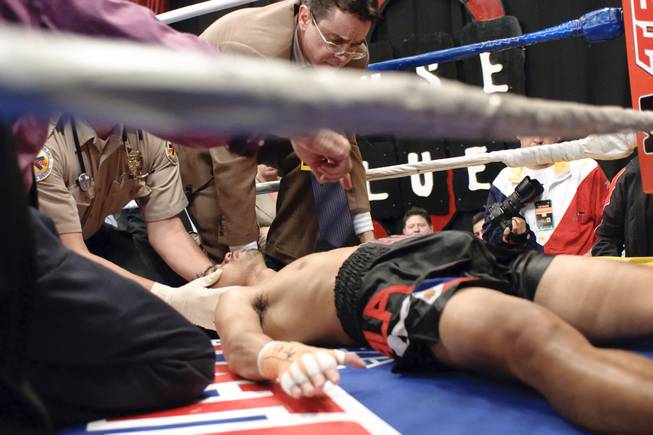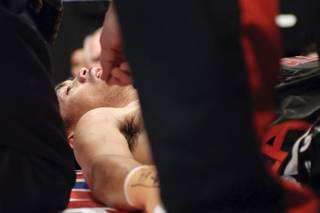
Ray Kasprowicz/FightWireImages.com
Medical personnel tend to Filipino boxer Z Gorres after he collapsed in the ring at the Mandalay Bay in Las Vegas, Nevada November 13, 2009. Gorres won his bantamweight bout against Luis Melendez but collapsed as he tried to exit the ring.
Saturday, Dec. 19, 2009 | 2:05 a.m.
Sun coverage
Seconds before Z Gorres collapsed, he enjoyed one of the proudest moments of his life.
Gorres, a 27-year old bantamweight boxer from the Philippines, scored a unanimous-decision victory against Colombian Juan Melendez on Nov. 23 at the House of Blues in Mandalay Bay.
Gorres circled the ring holding his home country's flag in celebration and asked his trainer, Edito Villamor, to grab a few loose items to keep as souvenirs.
"He was very happy," Villamor said through a translator. "He raised the Philippines flag. It was a lot of Filipino pride that he won."
But when Gorres returned to his corner, he realized he couldn't move his legs. He fell over, and ringside doctors immediately rushed to his side.
Gorres suffered a subdural hematoma, a form of brain hemorrhage, on the left side of his skull. A severe head injury of this kind in boxing usually occurs once per year, said Keith Kizer, Executive Director of the Nevada Athletic Commission.
It's a life-threatening injury, but Gorres was able to fight his way to stable condition. He's spent the month since the fight confined to a bed in isolation at University Medical Center.
The left side of Gorres' body is paralyzed, he can't speak and tubes help him breathe.
"Boxing was his way out of poverty," said UNLV assistant boxing coach Frank Slaughter, who has worked to raise money on Gorres' behalf. "This sickens me."
Born to fight
To understand Gorres' boxing career, it's important to understand where he came from.
Gorres grew up in the provinces of Agusan del Norte and Cebu in the Philippines, where boxing is king. He was drawn to the sport at a young age.
"I boxed with Z's older brother and he started going around with us at 6 or 7 years old," Villamor said. "He started boxing at 9 years old."
Gorres found immediate success. His feet were quick. His punches were precise. He picked up on some of the techniques his older brother, Jun, used.
His wife, Duchess, said he started getting impressive results at a young age, including three amateur national championships.
His professional career wasn't any less dominant. Gorres has a career-record of 31-2-2. Before his injury, he was considered a title contender.
Villamor said he always fought with heart for his country and the memory of his brother, who was stabbed to death in the Philippines four years ago.
Fight night
The second weekend of November shaped up to be monumental in the Filipino boxing community.
The MGM Grand would host a championship bout between perhaps the world's best boxer, Filipino Manny Pacquiao, and Miguel Cotto. But also, up-and-comer Gorres was one of the headliners on a Friday-night card across the street at Mandalay Bay.
Through the first nine rounds, the fight went perfectly for Gorres.
"He actually did really well," Kizer said. "Going into the 10th round, he was in complete control and really dominated the fight."
One punch, however, changed everything. Melendez connected with Gorres' head on a left cross.
Gorres went down with 30 seconds remaining in the fight, but got up after the referee reached eight on the 10-count.
"I was really worried because he got hit pretty bad with that one," Villamor said.
Although Gorres was visibly in trouble, he stayed up for the final few seconds to win the fight.
He listened to the announcer say he was the winner by unanimous decision and took his victory lap around the ring. Villamor will never forget what happened next.
"He just said he got hit, but he didn't mention he was dizzy or anything like that," Villamor said. "After that, he sat down and that's when he collapsed."
Meanwhile, Duchess was at home in the Philippines with the couple's four children awaiting the news from the fight.
Duchess' first indications were positive. It wasn't until later that she learned her husband was in critical condition.
"I got a text from a friend that Z won," Duchess said through a translator. "I went home and checked on the Internet and that's when I knew that Z collapsed. From reading the article, I knew it was that bad and that's when I started to worry."
The injury
Duchess' nightmare got worse when her phone rang.
It was Z's manager, who informed her that Z was being taken into the intensive care unit. No one knew if Z would survive the night.
"That's one of the worst things that's ever happened in my life," Duchess said. "I was really worried."
There was reason to be pessimistic. In 2005, two boxers in separate cases died in Nevada after suffering a subdural hematoma.
But Kizer said those incidents forced the Nevada State Athletic Commission to adopt tighter regulations and implement stronger emergency procedures — such as having three doctors ringside at all times during a fight.
Kizer said those changes could have played a role in saving Gorres' life. He said the response to Gorres' injury was the best he's seen.
"They got him to the hospital very quickly," Kizer said. "He was well-prepped. We've never seen that quick resolve. It was miraculous. That's coming from the hospital staff telling us he received some immaculate care."
Hospital staff admitted Gorres and he immediately underwent emergency brain surgery. It was successful and despite the odds, Gorres quickly was transferred out of the ICU and upgraded to stable condition.
Kizer said that although Gorres' situation was unfortunate, he didn't think anything else could have been done.
"At the end of the day, these guys are throwing hard strikes to the head," Kizer said. "That's why we have such strict requirements in the ring."
The recovery
Duchess Gorres arrived in Las Vegas 20 days after the fight to see her husband for the first time since the injury.
She said she heard in the Philippines all about the tubes he was connected to and was scared to walk into the room for the first time. Her fears quickly were alleviated.
"When I saw my husband, he was doing the act of trying to give me a hug," Duchess said. "But he couldn't do it because of his left side."
Duchess has spent every day since then at UMC with her husband. They communicate primarily by writing, as Z still has full use of his right hand.
She said he frequently asked about his children and the rest of his family back home. Sometimes, Z squeezes Duchess' hand as a sign of affection.
Duchess said she had seen steady improvement.
"He looks much better than when I got here," she said. "The problem is his left side is paralyzed."
No one knows how far Z's recovery will go. He will likely be paralyzed for the rest of his life, but there's no timetable for when he may be able to speak or breathe on his own again. Gorres will never fight again.
The focus now is getting Z healthy enough to take a medical flight back to the Philippines. Slaughter is trying to raise money to make the flight possible and is asking everyone who attended the Pacquiao fight the night before Gorres' injury to donate at least $5.
A PayPal account has been set up where the funds go directly to the family under the e-mail [email protected].
"I want him to go back to the Philippines," Duchess said. "But I first want him to be stable."


Join the Discussion:
Check this out for a full explanation of our conversion to the LiveFyre commenting system and instructions on how to sign up for an account.
Full comments policy